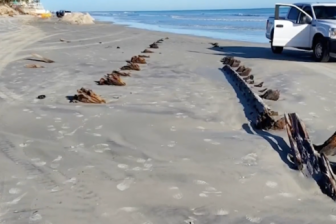Alberta’s NDP opposition leader says Premier Danielle Smith’s comments rejecting the legitimacy of the federal government betray her unspoken plan to lay the groundwork for eventual separation.
Rachel Notley cited Smith’s comments to the house just before members passed her sovereignty bill earlier Thursday, in which Smith rejected the federal government’s overarching authority.
“It’s not like Ottawa is a national government,” Smith told the House at 12:30 p.m. Thursday.
“The way our country works is that we are a federation of sovereign, independent jurisdictions. They are one of those signatories to the Constitution and the rest of us, as signatories to the Constitution, have the right to exercise our sovereign powers in our own areas of jurisdiction.”
READ MORE: Alberta passes sovereignty law, but first culls cabinet cattle
Speaking to reporters, Notley said: “At 12:30 last night when she thought no one was listening, the veil was lifted and Danielle Smith’s interest in actually taking initial steps towards separation was revealed.
“(They) demonstrate that her view is actually what is in line with these fringe separatist wannabes like people who drafted the Free Alberta strategy.
“Those comments are completely chaos-inducing.”

Free Alberta Strategy was a 2021 policy document drafted in part by Smith’s current top adviser Rob Anderson.
The paper’s authors argue that federal laws, policies and overreach are fatally wounding Alberta’s development.
They are pushing for a two-track strategy to achieve greater autonomy for Alberta within Confederation, while at the same time laying the policy and administrative foundations to transition Alberta to secession and sovereignty if negotiations fail.
The strategy was the genesis of Smith’s controversial sovereignty bill, which states that the Alberta legislature, rather than the courts, can make judgments about what is constitutional when it comes to provincial jurisdiction.
The bill also gives the cabinet the power to order municipalities, city police forces, health regions and schools to resist the implementation of federal laws.
READ MORE: Trudeau ‘extremely concerned’ about sovereignty laws’ impact on indigenous treaty rights
During question period, Smith rejected accusations that the bill was a separatist Trojan horse, noting that its intent was contained in the title.
“The name of the bill is Alberta Sovereignty Within a United Canada Act,” Smith said.
“The (act) has nothing to do with leaving the country. It has everything to do with repairing the relationship (with the federal government).
Political scientist Jared Wesley said it appears that constitutional chaos and enticing the federal government are the real goals.
“When you start denying the legitimacy of the federal government, that’s part of the troubling trend that ties it all to the convoy movement and the separatists,” said Wesley, with the University of Alberta.
“Albertans need to know that these comments are at best inappropriate and misleading and at worst sparking a crisis of national unity. Sooner or later someone will believe her.”
Wesley added that there is a sentiment among a small group of people in Alberta, including the premier, who are “just tired of losing and don’t want to play the game anymore,” he said.
“The sad thing is that that game is democracy and the rulebook is the Constitution, and they’re just ignoring it now.”
Political scientist Duane Bratt said Smith does not describe Canadian federalism.
“She’s confusing the European Union with Canada,” said Bratt, with Mount Royal University in Calgary. “Canada is not made up of sovereign provinces. We share sovereignty between orders of government.”
READ MORE: ‘Bum and stumble’: UCP caucus votes to propose changes to Alberta sovereignty law
Political scientist Lori William, also at Mount Royal University, said the comment “betrays a profound lack of understanding of Canada, of federalism, of what powers belong to the federal and provincial governments.”

During question period, Smith brushed off opposition demands that she refer the bill to Alberta’s Court of Appeal to determine whether it violates the Constitution.
Smith told the house that Justice Minister Tyler Shandro, a lawyer, had written the bill and that the government had received independent advice from constitutional lawyers to ensure it was not biased.
“The constitutionality of this bill is not in question,” Smith said.
The bill was introduced by Smith a week ago as centerpiece legislation to pursue a more confrontational approach with Prime Minister Justin Trudeau’s government on a range of issues deemed to be excessive in provincial areas of responsibility.
It was a short, brutal ride for the account.
A public outcry forced Smith’s government to introduce an amendment days after the bill was introduced to overturn a provision that gave him ongoing emergency-type powers to unilaterally rewrite laws while bypassing the legislature.
Alberta’s First Nations chiefs condemned the bill as trampling on their treaty rights and Smith’s Indigenous Relations Minister said more consultation should have been done.
Smith told the House she had met with indigenous leaders just hours earlier to discuss concerns and shared goals. She rejected the claim that the bill does not respect treaty rights.
“There is no impact on treaty and First Nations rights. That’s the truth,” she said.
Law professor Martin Olszynski said the bill remains problematic because it must be clear that the courts have the final say on the interpretation of the Constitution to stabilize the checks and balances of a democratic system.
He said Smith’s bill threatens that, perhaps putting judges in the awkward position of having to decide whether they are the ones to make those decisions.
“Can that judge exercise their judicial function without being affected by that very politicized context?” said Olszynski, with the University of Calgary.
“It essentially politicizes the judicial process.”





